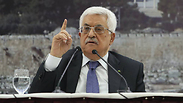
Source: Abbas doesn't want peace
Senior political source talks to Ynet, responds to Abbas's demands for extending peace talks, as additional meeting between sides ends without results.
Israel has responded to the demands set forth earlier today by Palestinian President Mahmoud Abbas according to which he would be willing to extend peace talks if Israel would freeze settlement construction and talks would focus on delineating final border arrangements between Israel and the future-Palestinian state.
Israeli, Palestinian and American negotiators met for another round of talks on Tuesday, though sources from both sides of the divide say strong disagreements remain.
"The meaning of what Abbas said," a senior political source said, "is that the Palestinians do not want peace. Because those who do (want peace) do not continue to make demands they know Israel cannot accept."
Related stories:
- Abbas: Borders outline, settlement freeze or talks will end
- Abbas threatens to dismantle Palestinian Authority
- Bayit Yehudi backs Bennett: We'll quit coalition if Israeli-Arab terrorists freed
Over the weekend Yedioth Ahronoth exposed that Abbas said that should talks fail, he would dismantle the Palestinian Authority, a move that would leave Israel responsible for 2.5 million Palestinians living in the West Bank.
Earlier Tuesday, speaking before a group of Israeli journalists, Abbas resounded the claim, and laid out the Palestinians' demands for extending peace talks: A three month freeze in settlement construction, during which time the negotiation teams would work on outlining the borders of "where Palestine will be," as Abbas said.
The senior political source said: "Abbas wants to receive without giving anything, he will continue to do so until the international community will demand he treat talks seriously and focus on making process."
The source also slammed Abbas for reconciliation talks his Fatah party is holding with rival Palestinian faction Hamas – which split after Hamas violently ousted Fatah from the Gaza Strip in 2007 – and are now attempting to bury the hatchet, with a PLO delegation arriving in Gaza
"Behind the empty statements on peace, Abu Mazen (Abbas' nickname) is holding unity talks with Hamas, which around the world is considered a terror organization bent on destroying Israel and killing Jews."
He echoed the claims made by Prime Minister Netanyahu on the issue: "Yesterday the Palestinian Authority discussed dismantling, today it is mulling uniting with Hamas. Let them decide whether to dismantle or unite.
"When they want peace, they should let us know. Because we want a lasting peace. Today, on a holiday, our enemies launched rockets on our towns, and our policy is clear – respond with immediacy and intensity."
No PA?
Abbas told a group of Israeli journalists on Tuesday that if peace talks do not continue, Israel will have to take on the burden of governing Palestinian lands.
Though Abbas has repeatedly hinted that he could devolve some of the limited powers his Palestinian Authority exercises in the Israeli-occupied West Bank, his statement added urgency to a U.S. effort to extend negotiations set to expire next week.
"If the negotiations stop, it's the Israeli government that will bear the responsibility for the economic situation and the paying of the salaries of (Palestinian) employees, workers and farmers, for health and for education just as it did before the establishment of the Authority," he told the reporters visiting his presidential headquarters in Ramallah.
"Also it will bear responsibility for security, meaning Israel will bear full responsibility ... We hope that we won't come to this period but that we come to solutions," he said.
US Secretary of State John Kerry revived the peace talks in July after a nearly three-year hiatus, with the aim of ending a decades-old conflict and establishing a Palestinian state alongside Israel.
Palestinians seek a state in Gaza, the West Bank and East Jerusalem. The Oslo interim agreements signed by the two sides in 1993 created the Palestinian Authority to govern Palestinian areas until the signing of a final agreement - which has proved elusive.
The negotiations plunged into crisis this month when Israel refused to carry out the last of four waves of prisoner releases unless it received assurances the Palestinian leadership would continue the talks beyond an April 29 deadline for a peace deal.
After Israel failed to free the prisoners, Abbas responded by signing 15 international treaties, including the Geneva Conventions on the conduct of war and occupations. Israel condemned the move as a unilateral step toward statehood.
Fourteen of the prisoners Israel had agreed to free from its jails are Arabs with Israeli citizenship. Abbas said on Tuesday he rejects an Israeli demand to deport them away from their homes to the West Bank or Gaza as a security precaution.
While both sides have said they are willing to extend the negotiations, Abbas said Israel should commit to freezing settlement activity on occupied land and focus on demarcating the borders of a future Palestine.
Israel has been keen for Palestinian leaders to recognise it as a Jewish state - something Abbas has refused to do - and has been reluctant to commit to the pre-1967 lines as the basis for borders between two states.
An official in the Israeli prime minister's office condemned the statement by Abbas, nicknamed Abu Mazen, saying it showed a lack of Palestinian commitment to the peace process.
Reuterscontributed to this report










